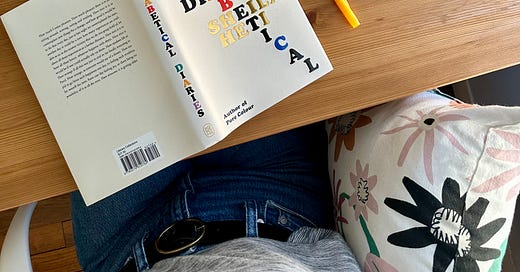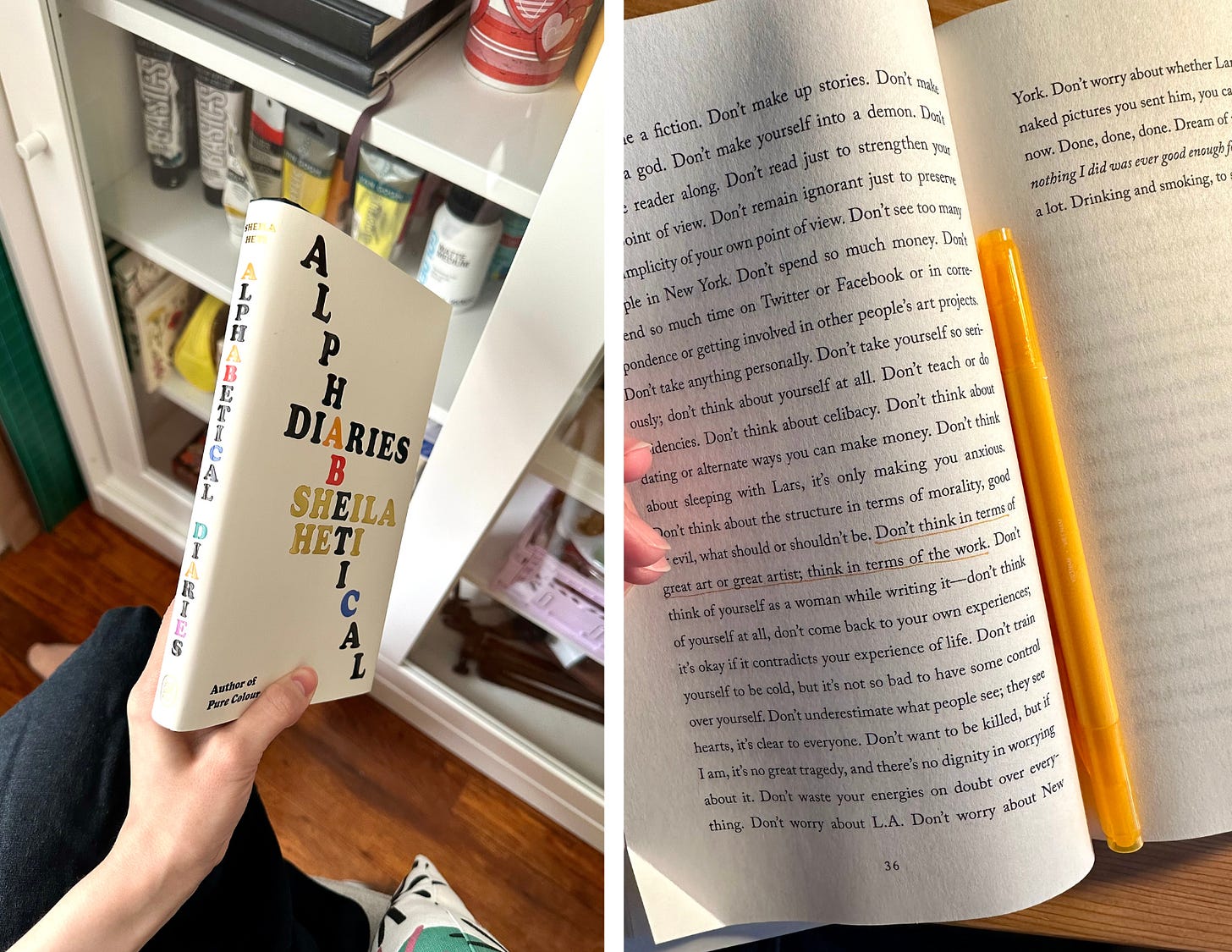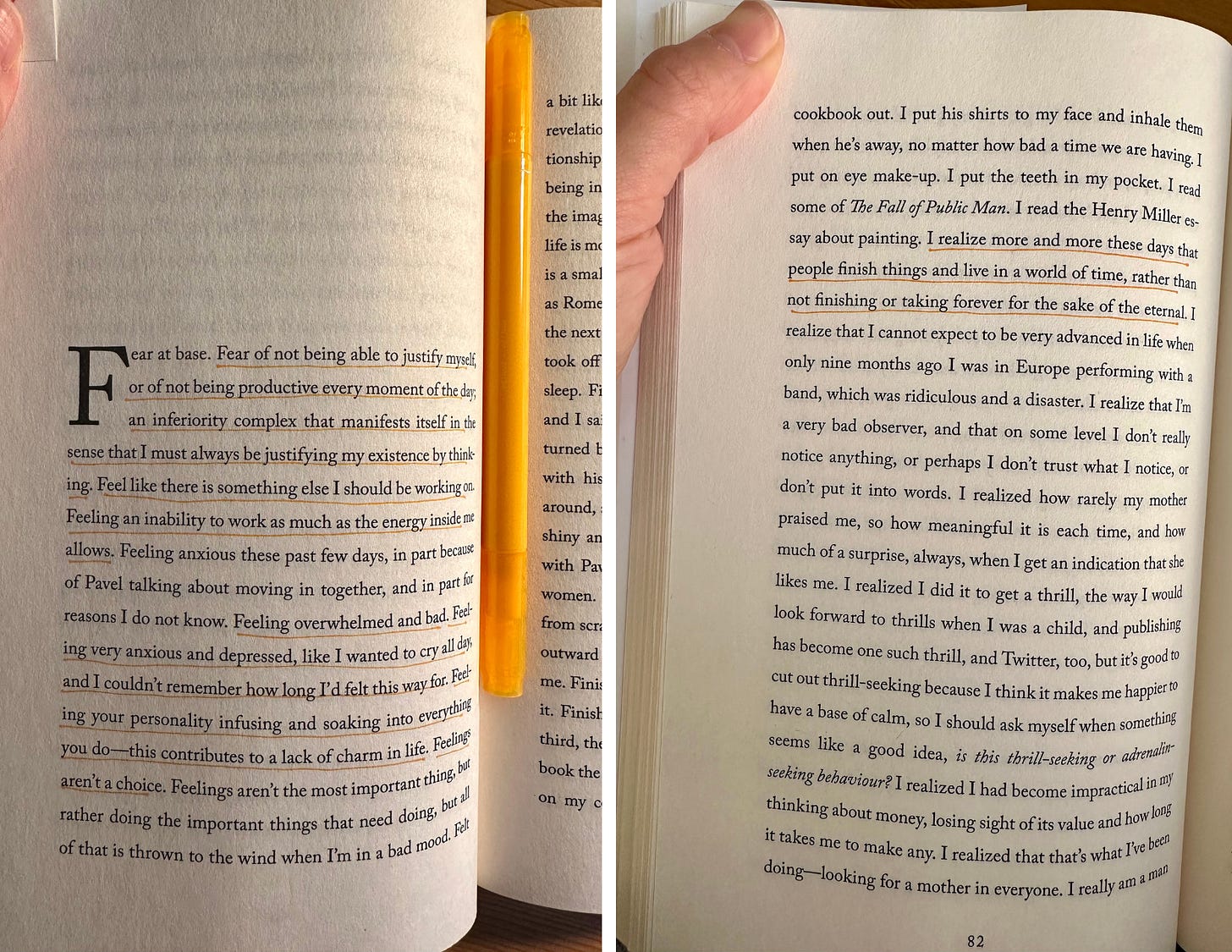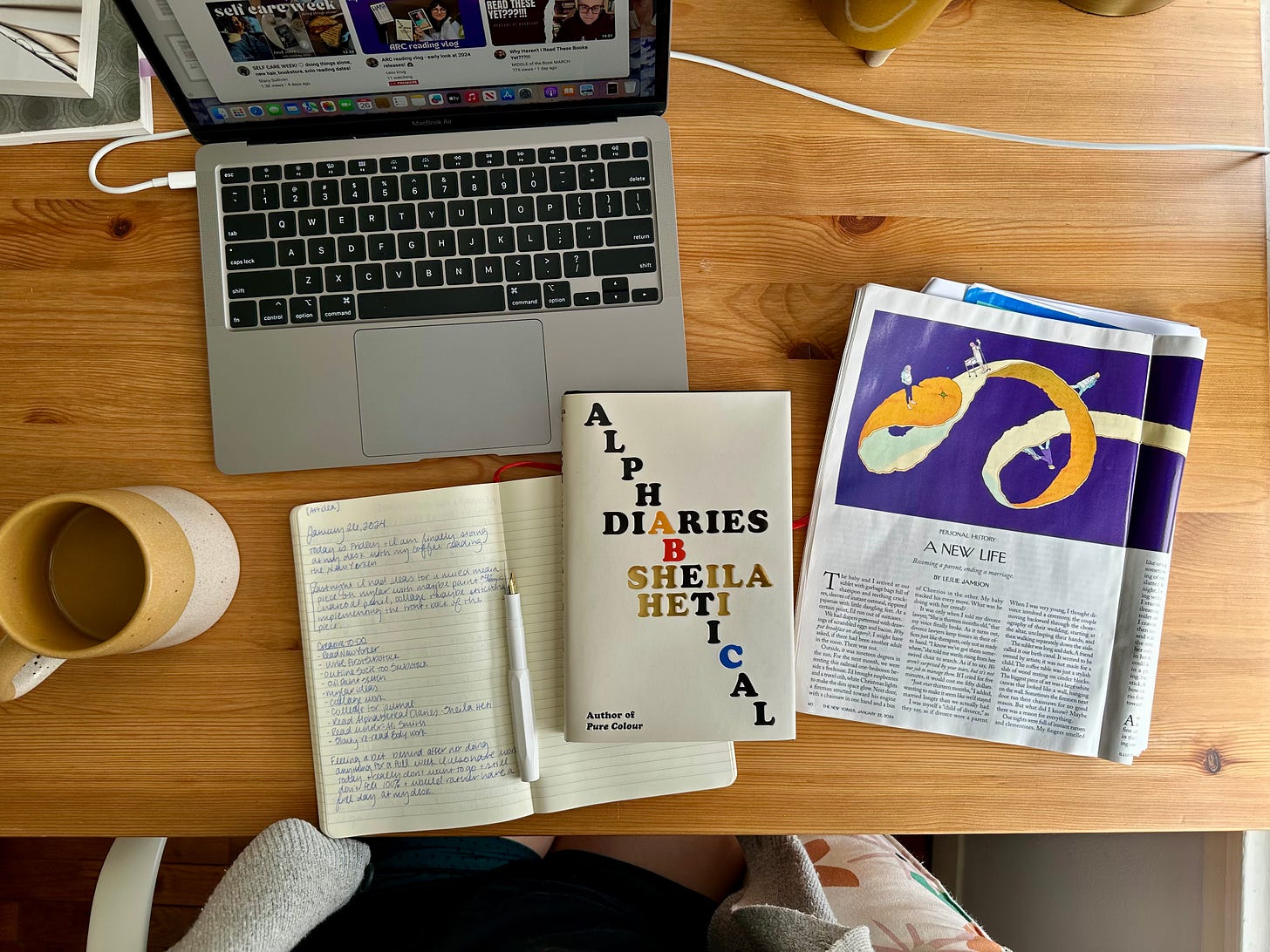Alphabetical Diaries by Sheila Heti
The linearity of writing ourselves. A review of Alphabetical Diaries and personal musings on the diary.
On our way home from working at a coffee shop, M asked how my reading had gone, something he typically asks and is often met with a one-word answer, “good,” “fine,” or “slow.” None of these are negative; I may be getting the feel of things or am too hungry to give a detailed answer. This time, however, we had a whole discussion lasting multiple blocks. I had a lot to say. He asked specific questions about Alphabetical Diaries by Sheila Heti, the concept of which I obsessively told him about two years ago after reading excerpts in The New York Times. A question he asked was about the structure of Alphabetical Diaries. He knew it was in Alpha order but wanted to see if it was linear. I replied, "It's out of order in the sense that there isn't a linear narrative. But it's also in order because the sentences are sorted alphabetically, with some editing for clarity, I'm sure." In interviews, Heti has said she gathered ten years of typed diary entries and decided to input them into an Excel document one day and alphabetized them as an experiment to see what patterns, if any, could be found through the repetition of phrases, ideas, complaints, etc.
In a 2021 interview with Ross Simonini, host of the podcast Subject, Object, Verb, Heti shares that she created Alphabetical Diaries as a way to excavate a truth about herself:
I wanted to see if anything changes over ten years. I just wanted to know if I’d grown, or I’d stayed the same.
M asked, “How had this never been done? It’s such an obvious, clever experiment,” and I agree! Although Heti has said she was inspired by Édouard Levé’s Autoportrait, the cannon is full of multiple diaries from various writers -- authors like May Sarton, Sylvia Plath, and David Sedaris, just to name a few. One could argue that most memoirs and some essay collections are a form of published diaries. They just take on a different form.
Alphabetical Diaries is a non-linear personal storytelling experiment, but is a diary or journal really linear? Is the idea of alphabetizing ten years' worth of diaries different from a regular daily diary? Looking over my diary entries, I often find they are a dumping ground for emotions, ideas, irritations, inspiration, and things to do, jumping from emotion to ideas in a single paragraph. They are unapologetically navel-gazing, and often, I’ll repeat myself, willing a documented moment or feeling to be different the next time I write it down.
This leads me back to Heti’s book. Reading it felt a bit frantic, propulsive, obsessive, like you can’t slow down or stop until the end of the letter. Many times, I kept starting over on pages, trying to read slowly and absorb each sentence, but is that really the point when you don’t have a linear narrative?
For instance, on page 134, Heti writes:
Nothing really happened this month. Now all of a sudden I feel a longing for Pavel. Now all the men I liked are lost to me, and all the men of lesser importance as well. Now he is gone and I feel fine. Now I am drinking tea. Now I am feeling like shit. Now I am getting tired, so I will write one more story and then go to bed. Now I am not living honestly again. Now I am reading fiction.
Often, one sentence gives the reader something to grasp onto, then the next tosses you somewhere else, and the following sentence might give you a hint at the first again. Sections have repeating words at the start of each sentence, similar to the example above, and often, the feeling of that word, the way it’s repeated over and over in your head, gives you a strange, anxious experience while reading.
Keep. Keep. Keep. Maybe. Maybe. Maybe. Now. Now. Now.
One minute, Heti is having sex with one lover, contemplating being a writer, wanting to end a relationship, and talking about her new haircut, then back to sex. You have re-occurring characters or people, questions about her next book, and evident moments of a writer whose personal life and life questions can’t help but seep into her work.
Heti herself has written three novels that are highly auto-fictional. It makes sense that I couldn’t help but find glimmers of her novels sprinkled throughout her diaries.
For instance, glimpses of How Should a Person Be? can be found here:
Maybe my fantasies for my life are those of a much younger person, who hadn’t yet become this person, or was on her way to becoming someone else but ended up as this person, and no longer needs to pin her girlish hopes on frail or too-simplistic fantasies.
Motherhood, her book about a woman contemplating the idea of being a mother by flipping three coins, known as I Ching, can be seen when she states multiple times that maybe she will be pregnant in a year. That maybe having a child and a husband is the answer. Perhaps abandoning the hard life of a writer and embracing a family is the key to a lifetime of happiness. She also brings up finding a gold coin or is looking for a gold coin multiple times.
Pure Colour is Heti's most abstract and philosophical novel about God's first draft of the creation of the world, written after the death of her father. In the letter D section, we have moments where her Dad and his illness are mentioned. Questions about God and creation appear later.
You see magic and beauty everywhere. You see the ants and the birds and the squirrels and the clouds-they also have no aim.
I can't help but see glimmers of a world and all its creatures being created.
In the hands of another writer, this could have been merely an interesting experiment. Random at best. But in the hands of Heti, this ten-year span illuminates common themes of human existence and experience, love, sex, disappointments, and wondering where we went wrong. Questioning if the wrong turn was in our past. Questioning if we had gone in another direction if life now would be simpler, more straightforward, a bit easier.
Alphabetical Diaries is compulsive; I couldn’t stop reading. I read it as though I found someone’s diary while they were out and needed to read it as fast as possible before they came back into the room (something I would never actually do). Heti has captured universal feelings. I felt relieved knowing I wasn’t the only one feeling these deep feelings and obsessing over love, craft, and one's place in the world. It’s selfish to ever think I was. Alphabetical Diaries is feverish, compulsive, and obsessive- all the ways we often express ourselves in our diaries.
While you can read Alphabetical Diaries without having read any of Heti’s other novels, I think it’s beneficial to read at least one, if not all, three. If you have never read any of Heti’s work, I suggest starting with Motherhood.
I recommend listening to Reading the Room Podcast created by Jaylen Lopez. His recent interview with Heti was beautiful; he always asks the most interesting and unique questions, leaving space for a natural dialogue.









Thank you for this review! I am also an avid journaler and love getting glimpses into others journals. I will add Heti's work to my list.
Amazing review! I have read Pure Colour and add this one to the list. :)